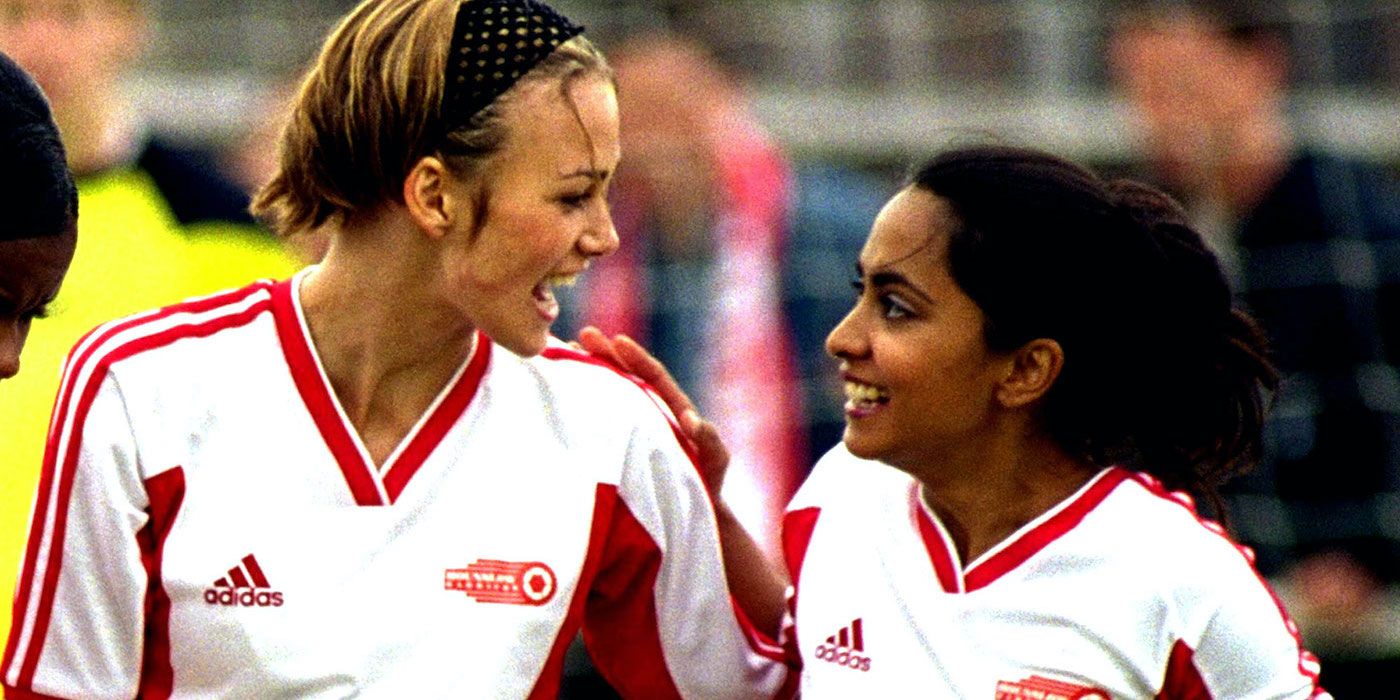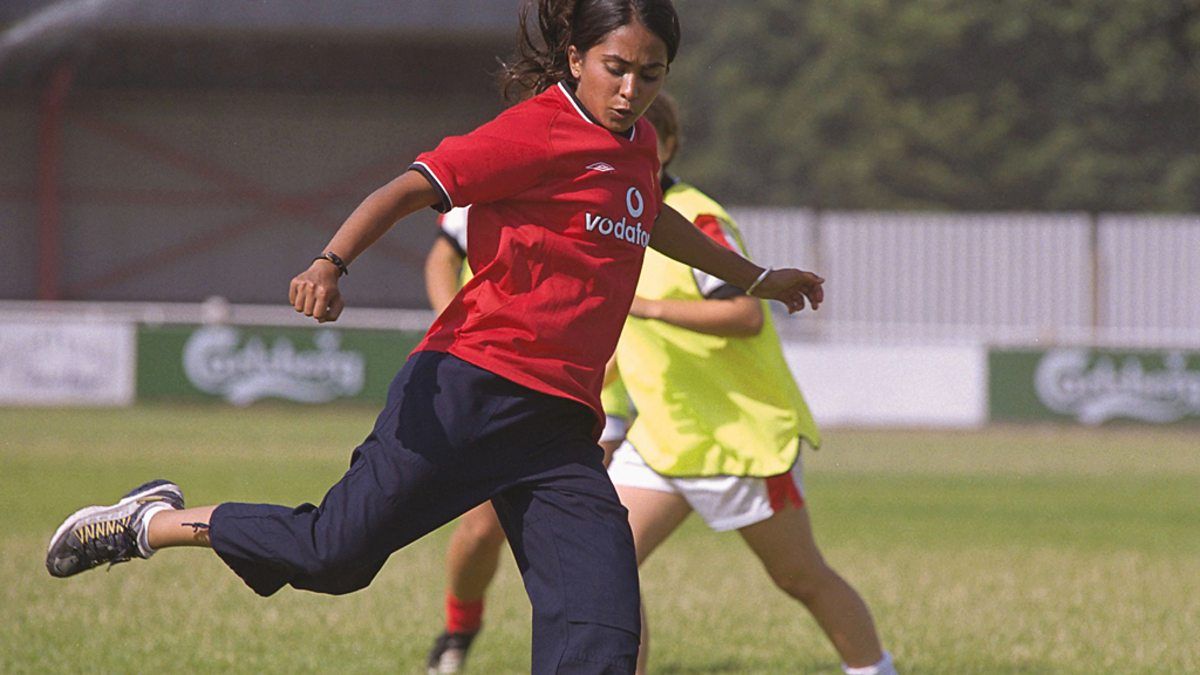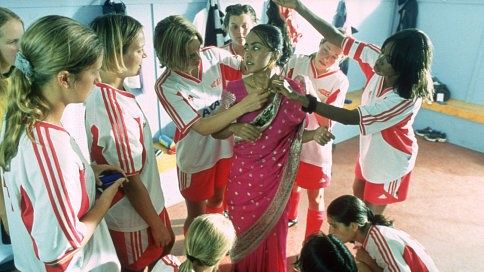The Big Picture
More than 20 years ago, Jess Bhamra (Parminder Nagra), an 18-year-old British Indian football fanatic, first graced our screens in a surreal initial dream scene entrance, her face photoshopped onto a football player running around a pitch, and her goal being discussed by dream-version Gary Lineker in the BBC Sports Studio newsroom. Today, Gurinder Chadha’s humbly-originated film is considered a global box office smash-hit; its iconic 2000s nostalgia, quirky humor, and important portrayal of themes related to identity and culture, all making it a timeless classic.
One thing that stands out about this film is that no one, from the cast to the director herself, thought the film would go on to have the success it did. Bend it Like Beckham, both written and directed by Gurinder Chadha, the first-ever British-Asian woman to direct a full-length feature film with her 1993 Bhaji on the Beach, went on to gross almost £60 million at the box office, alongside receiving global critical acclaim for its wit, coming-of-age relatability and its uniquely authentic representation of British-Asian culture. Many also consider it today as a film that was well before its time.
What Makes ‘Bend it Like Beckham’ Iconic?
Despite some of the film’s questionable elements, like the power dynamic of the romantic relationship between coach Joe (Jonathan Rhys Meyers) and 18-year-old Jess, it’s easy to see how this is a such a widely held view of Bend it Like Beckham, from the way it embraces queerness in South Asian communities, breaks down stereotypes of women, and generally showcases female intersectionality, all through a unifying theme of comedy. Not only did the film take a deep-dive into crucial themes of identity and British-Asian culture in a way that had never been done before, or sadly, even since its release, Bend it Like Beckham also captured the best of British culture and shed light on the renowned game of football as one of very few aspects of “Britishness” that tends to successfully unite the whole nation, which is somewhat ironic, given the still-prevalent racial disparities and systemic exclusion that operates behind the scenes. Clearly, in terms of systemic racism and discrimination, we still have a way to go in both the US and the UK, as much still remains the same since 2002, but the film was certainly unique in bringing these issues to the forefront, especially important at a time of heightened discrimination towards South Asian communities in a post-9/11 world.
As Gurinder Chadha has stated herself, the film was intended to be about the “bending of rules rather than the breaking of rules or breaking of tradition.” To me, as a person of South Asian descent, just being able to see someone who looked like me on screen in the UK, a darker-skinned Indian girl, was already in itself a bending of the rules; a momentous step away from the norms of television and films that I had grown up with. Not only did the film simply feature one character like this, but Jess Bhamra was the star of the film, not a side-kick or forgotten about, punch-of-the-joke role. For myself, my sister and many South Asian friends who grew up in late ‘90s to early 2000s Britain, the film reflected so much of our childhood and cultural communities with an eerie level of accuracy – in particular, the struggles of growing up between two cultures and trying to fit in between two worlds, at a time when topics like racism were considered to be more “taboo” to discuss perhaps compared to today’s teen “Gen-Z” generation. As such, we all looked up to the fictional characters portrayed so vividly and humorously in the film, where Jess Bhamra in particular pushes boundaries in all the best ways, embodying the film’s premise of bending the rules and even symbolizing a subtler form of teenage rebellion.
The film continually pushes the boundaries in so many other ways too, really making it the ultimate underdog film for underdogs, from the perception of women in sports, to the portrayal of immigrants in the UK. While some may argue that certain characters like Jules (Keira Knightley) succumb to stereotypical depictions of what women who love sports should supposedly be like — tomboys who hate all things “girly” — many fans of the film definitely resonated with Jules’ character arc as she slowly manages to convince her mother to support her sporting ambitions.
‘Bend it Like Beckham’ Gives Us Nuanced Characters
Other characters are more nuanced and complex in the way that they raise questions of what is considered to be “conventional,” Jess’s older sister, Pinky (Archie Panjabi), being a key example. On the surface, Pinky is just another make-up loving, boy-obsessed, classic “girl” who is desperate to get married. Taking a deeper look, though, Pinky’s character strays away from several South Asian conventions of what is considered to be a “good immigrant daughter,” proudly loving her fiancé and appearing clearly happy on her wedding day — something that even the wedding photographer reacts in surprise to. “Eyes down! Look sad! Don’t smile! Indian brides never smile. You’ll ruin the bloody video!”
From a western perspective, there may appear to be nothing groundbreaking about Pinky’s character. But she definitely bends the Bollywood-like expectation of Indian brides, unhappy on their wedding days, due to historical context that stems from the discouragement of newly married Indian women from visiting their parental homes and the traditionally common arranged marriages that used to dominate Indian partnerships. Chadha’s film certainly differs entirely from Bollywood portrayals of South Asian characters, while still celebrating the culture, taking on an East-is-East-like brutally honest-yet-comedic depiction of the lives of immigrants in the UK that crucially enables people of color and immigrant families to be the making of all aspects of humor, instead of the butt of the joke. It is this very element that makes the film so relatable to those of us who not only grew up in between two worlds, but found it actively difficult to navigate their differing expectations, a wider concept that is familiar to people regardless of their cultural background who perhaps struggled to “fit in” in other ways.
‘Bend it Like Beckham’ Shows Women Can Excel in Sports, Too
Aside from the specific characters, the film consistently focuses on depicting women as athletic symbols instead of sexual objects, all the montage-like sequences of football practice sessions and matches really making it a classic sports comedy with women at its forefront. Through its unique intersection of football and cultural community, it makes sense that Bend it Like Beckham was so successful across the UK before its wider success over the globe. The BBC recently released a short documentary feature on the film, presented by Miriam Walker-Khan, a BBC Sports journalist, which shows the real, tangible impact the film had on the lives of so many young football-loving women from all racial and class backgrounds across the country — including one South Asian woman footballer, now playing for the Women’s Super League. In the documentary, she talks about how looking up to Jess Bhamra’s character actively changed the course of her life, inspiring her to pursue professional football. The film was evidently the first of its kind to focus on women’s football in any way, making it a standout cultural piece in a football-obsessed country.
Despite all the fairly serious issues covered in Bend it Like Beckham, Gurinder Chadha’s style of comedic writing and directing is truly what made the film a cultural phenomenon. Instead of veering into darker territories, the film exemplifies all the best-loved elements of rom-com and coming-of-age comedies, with quotable lines, an upbeat 2000s soundtrack (you can almost hear Curtis Mayfield’s “Move On Up” playing when you just think about the film), and the cliché timings of all the most pivotal life events occurring on the same day. The humor is wonderfully satirical, managing to appeal to the inside-joke nature of people in-the-know about South Asian community events, while also engaging wider audiences with its references to 2000s pop culture like the infamous Spice Girls, and its all-round broader nod to the universally-all-too-well-known dramatic teen years (cue Jess sitting on the floor of her bedroom gazing at a poster of David Beckham on her walls).
Alongside the comedic dialogue, the film contains so many visually beautiful and important depictions of South Asian communities, with the scene of Jess being dressed in a sari by her Hounslow Harrier teammates in the girls’ changing room standing out as a metaphor of her clear belonging despite her differences: a metaphor that serves as a reminder to embrace what makes you unique — truly a coming-of-age hallmark moment.
There’s simply nothing quite like Bend it Like Beckham, as Chadha stated in an interview with Gal-dem magazine, “I was able to say: ‘This is what it’s like for us. We don’t have to just be what you think we are, we can also be this.’”










